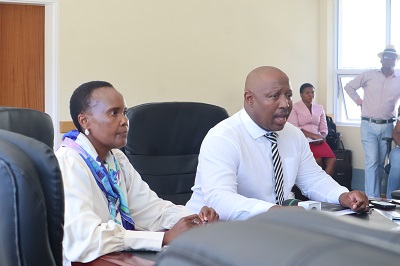By: Mpho Shelile
It is no secret that the squabbles in the public transportation of Lesotho’s industry is a never ending brawl, however in order to improve mobility in urban areas the board of directors through the ministry of public works and transport held a press conference at Ha Foso Monday the 15th.
The traffic commissioner, Mrs. Mathabo Tšosane indicated that to ensure easier mobility in urban areas mini-taxis (4+1) are going to be given more movement, stressing how critical mobility is in modern city living, and taxi services play a pivotal role in providing convenient transportation solutions. “We will focus on the transformation of 4+1 operating conditions; which include giving out of D-permits to them and as the road transport board it is our duty to ensure easier mobility,” she said.
Mrs. Mathabo explained that in order to address the challenges associated with congestion, pollution, and accessibility, cities are exploring innovative strategies. Adding that one such approach involves extending the operational range of taxis, allowing them to cover more kilometers within the urban landscape than they used to which was only 10 kilometers according to condition number 8. Stating that in order to delve into the potential benefits and considerations associated with this initiative Basotho should be willing to accept the terms and conditions that come with this new change.
As urban population continues to grow, the city of Maseru also grows. It seems to be grappling with increased traffic congestion, longer commuting times, and environmental concerns. Traditional modes of transportation contribute to these challenges, making it imperative to find sustainable solutions. Taxis, being a ubiquitous requirement in urban areas are in a unique position to contribute positively to the mobility landscape.
She proclaimed that change is good, and we should be willing to embrace it for a better improved future. Acknowledging the transition from buses, sprinters, mini buses then to mini-taxi’s, adding that the revolution is as clear as day. Noting that according to condition 8 supported by condition 13 which states that there might be a disturbance among the already working system due to the municipal ranges already followed.
Mrs. Mathabo asserted that one promising strategy to enhance urban mobility is to grant taxis a greater operational range, allowing them to cover more kilometers within city limits. She declared that this extension can be achieved through a combination of regulatory adjustments, technological advancements, and collaborative efforts between city authorities and taxi service providers.
“Extending the operational range of taxis ensures that more neighborhoods and remote areas within the city receive efficient transportation services. This improves accessibility for residents who may have been underserved in the past. A good example being Masowe3,”said Mrs. Mathabo.
She further said an effective extension of taxi operational range requires a well-defined regulatory framework. City authorities must work closely with taxi service providers to establish guidelines that ensure safety, efficiency, and compliance with environmental standards. Focusing mainly on the safety because passengers have been pulled out of cars through windows and threatened so this time around the case should be different since proper channels will have been followed to ensure smooth operation.
“Extending the operational range of taxis represents a forward-thinking approach to improving urban mobility. By embracing innovation, collaborative planning, and regulatory adjustments, cities can create a more connected and accessible transportation network. As urban landscapes evolve, the extension of taxi operational ranges stands out as a promising solution to meet the growing demands of modern city living,” she concluded.
Ministry of Public Works and Transport Operations manager, Mr. Maama Letsie stressed that taxi service providers and different transport stakeholders have come to an agreement that this is a more efficient way to enhance mobility and is a multifaceted approach which addresses various challenges such as traffic congestion, public transportation efficiency, infrastructure development, and sustainable urban planning.
However he stated that many urban areas face issues with outdated or insufficient public transportation systems, leading to overcrowding and unreliable service. So they will kick start this new system within Maseru and expand it to other districts should it prove efficient.
Enhancing mobility in urban areas is a complex task that requires a holistic approach. Success depends on the collaboration of government bodies, private enterprises, and the community. Even though hiccups are bound to be encountered advancements in technology, sustainable practices, and strategic planning will significantly improve urban mobility. “There will be another press conference very soon to make sure the public is up-to-date in every step taken regarding this new transport system in order to avoid resistance to change or lack of awareness among the public,” he concluded.


